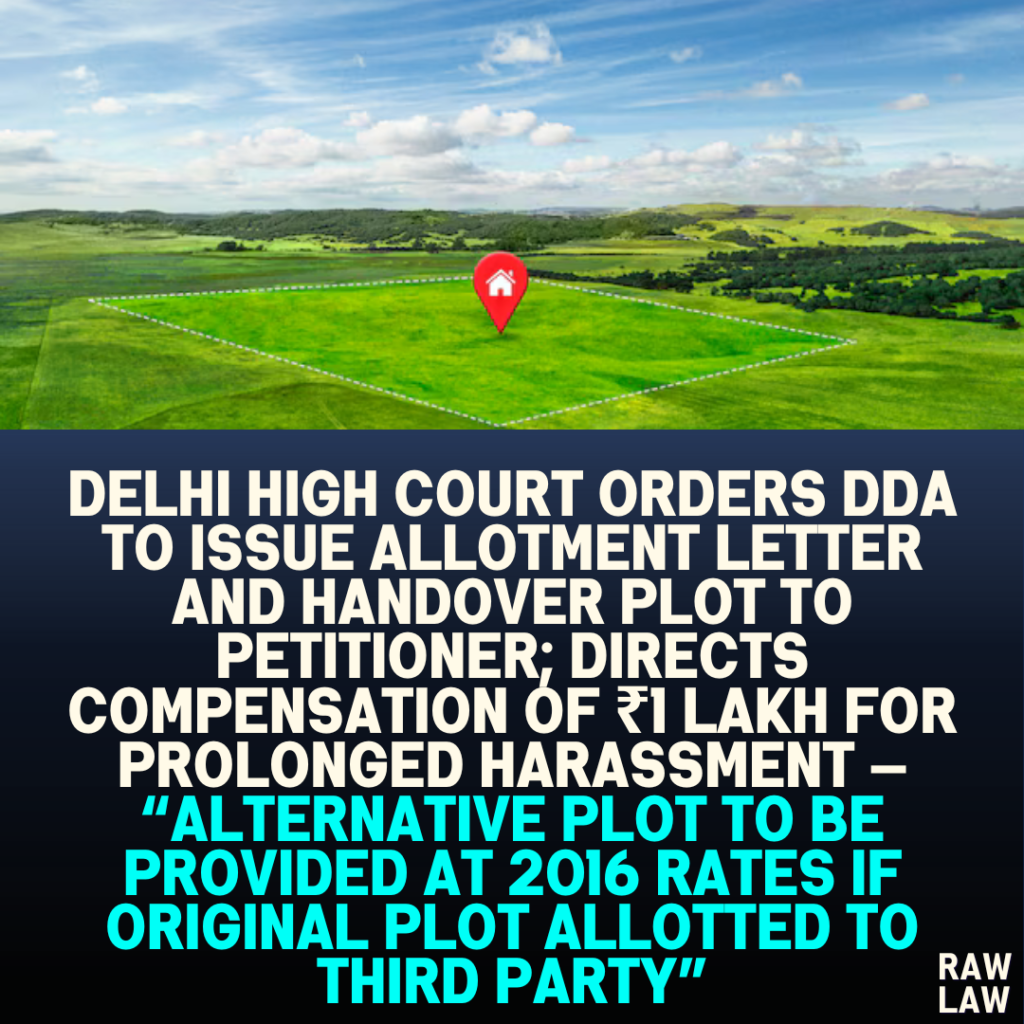Court’s Decision:
The Delhi High Court directed the Delhi Development Authority (DDA) to issue an allotment letter for an MIG plot to the petitioner within two months, pursuant to a draw of lots conducted in 2016. The Court also ordered the DDA to hand over the physical possession of the allotted plot to the petitioner or, in case the plot has been allotted to a third party, provide an equivalent plot in the same sector at the 2016 rates. Additionally, the DDA was directed to pay ₹1 lakh to the petitioner as compensation for the prolonged delay and harassment.
Facts:
The petitioner, a senior citizen, had registered for the allotment of a plot under the Rohini Residential Scheme, 1981 (RRS, 1981) by depositing the earnest money in 1981. After 25 years, in 2005, he was declared ineligible on the grounds that he had already been allotted a flat under the New Patterned Registration Scheme (NPRS), 1979. Subsequently, he surrendered the NPRS allotment to become eligible for the RRS scheme.
In 2014, the DDA acknowledged his eligibility for participation in a computerized draw of lots for an MIG plot. The draw of lots took place on October 28, 2016, where the petitioner’s name was selected for a plot in Sector 29, Rohini. Despite his repeated follow-ups, the DDA failed to issue the allotment letter or hand over possession. During the pendency of the writ petition, the DDA cancelled the petitioner’s allotment, citing a procedural violation concerning his earlier registration under NPRS.
Issues:
- Whether the petitioner’s eligibility for the RRS, 1981 was affected due to his previous registration under the NPRS, 1979.
- Whether the cancellation of the allotment by the DDA after the petitioner’s selection in the 2016 draw was legally sustainable.
- Whether the DDA’s delay and conduct amounted to harassment and dereliction of public duty.
Petitioner’s Arguments:
The petitioner argued that he had voluntarily cancelled his registration under the NPRS, 1979 in 2007 to qualify for the RRS, 1981 and had informed the DDA accordingly. He contended that the DDA’s reliance on Clause 4 of the RRS, 1981 terms and conditions was misplaced, as it was only a “priority clause” that did not bar fresh applications. Moreover, the petitioner argued that the DDA, by confirming his eligibility and including him in the draw of lots, was now estopped from taking a contrary stand.
The petitioner also cited several decisions of the Delhi High Court and the Supreme Court to support his claim that the DDA’s cancellation of allotment after decades of delay was arbitrary and unjust.
Respondent’s Arguments:
The DDA maintained that the petitioner was ineligible for allotment under RRS, 1981 since he did not comply with Clause 4 of the scheme’s terms and conditions, which mandated the transfer of registration from NPRS, 1979 to RRS, 1981. They argued that the Screening Committee had reviewed the petitioner’s case and recommended the cancellation of his allotment due to non-compliance with procedural requirements. The DDA contended that the petitioner’s long delay in seeking redress further weakened his case.
Analysis of the Law:
The Court meticulously analyzed Clause 4 of the RRS, 1981, which provided that applicants under NPRS, 1979 could transfer their registration to RRS, 1981 and form a separate block for allotment with priority consideration. The Court observed that the clause did not bar applicants from independently applying under RRS, 1981 after cancelling their NPRS registration. The DDA’s interpretation of Clause 4 was held to be erroneous as it conflated “priority in allotment” with “eligibility for allotment.”
Precedent Analysis:
The Court relied on its earlier rulings in similar cases, including Delhi Development Authority v. Shail Shukla, Kishan Chand Saini v. Delhi Development Authority, and Dhanesh Kumar Jain v. Delhi Development Authority, wherein it had held that procedural violations cannot override the substantive rights of the applicants, particularly when the authority had acknowledged eligibility and initiated the allotment process.
The Supreme Court’s decision in Rahul Gupta v. Delhi Development Authority was also cited to emphasize that public authorities cannot unjustly deprive applicants of their rights due to bureaucratic inefficiencies.
Court’s Reasoning:
The Court found that the petitioner’s actions in cancelling his NPRS registration and informing the DDA were bona fide and timely. The DDA’s conduct of issuing a cancellation letter years after confirming eligibility and conducting the draw of lots was deemed arbitrary and in bad faith. The Court also took a strong view against the DDA’s bureaucratic hurdles and noted that the petitioner, being a senior citizen, suffered unnecessary harassment due to the DDA’s inefficiency.
The Court further held that the doctrine of estoppel barred the DDA from cancelling the allotment after having affirmed the petitioner’s eligibility multiple times and including him in the 2016 draw.
Conclusion:
The petition was allowed, and the Court issued a mandamus directing the DDA to issue the allotment letter and hand over possession of the plot to the petitioner. In case of third-party allotment, an alternative plot of equivalent size was to be provided at 2016 rates. The DDA was also ordered to pay ₹1 lakh as compensation for the prolonged harassment caused to the petitioner.
Implications:
The judgment reaffirms the rights of applicants under public allotment schemes and sets a precedent against arbitrary cancellations by authorities. It highlights the duty of public authorities to act fairly and transparently, especially in cases involving senior citizens who rely on these schemes for their housing needs.
The Court’s decision sends a strong message that procedural lapses by applicants should not be used as a pretext by public authorities to derail genuine allotments, particularly when the authority itself has contributed to delays and confusion through its mismanagement.



